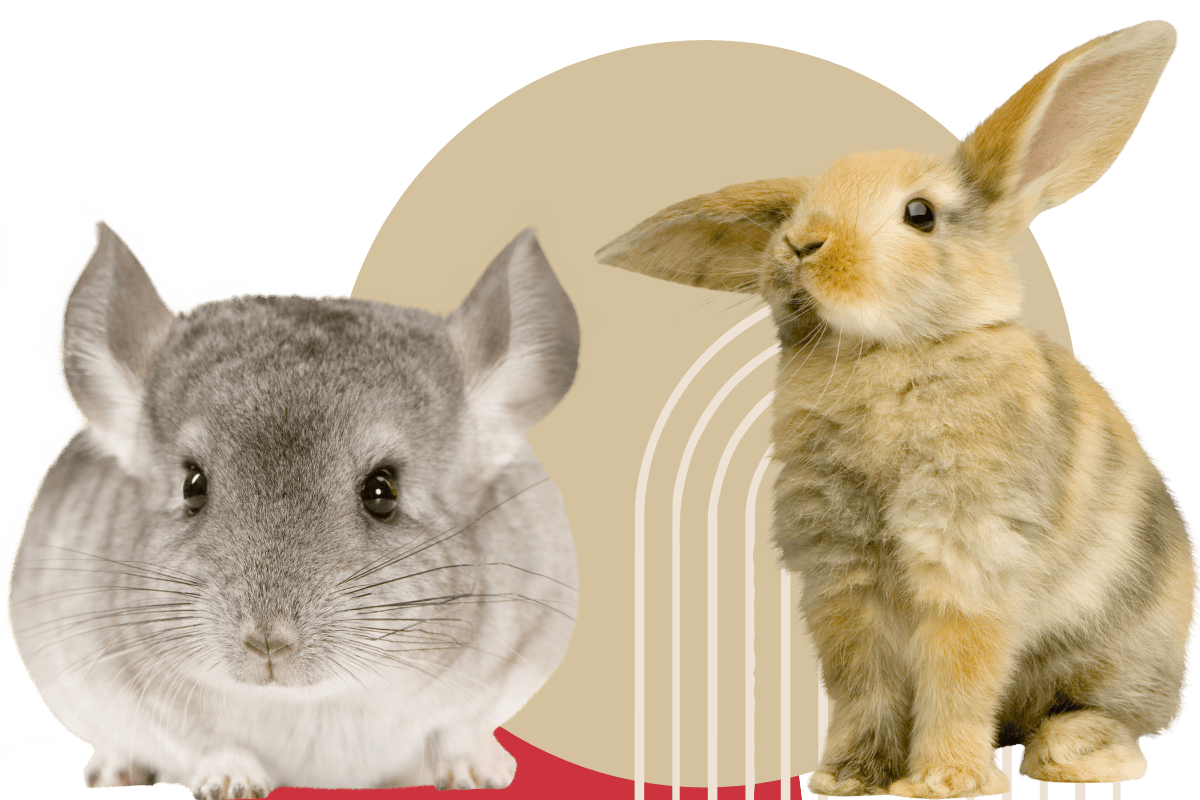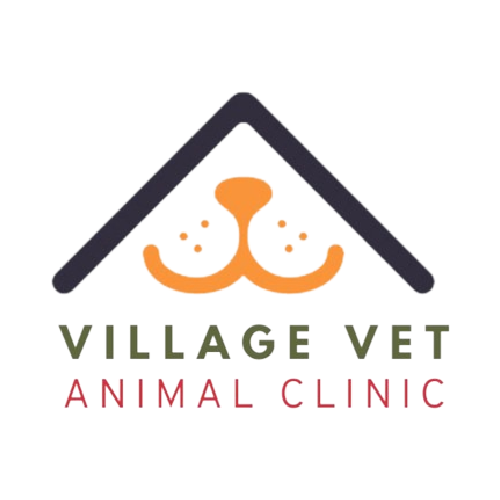Village Vet Animal Clinic Pet Care
Discover insights into caring for various species. We’re here to provide pet care answers tailored to each animal’s specific needs.

Pet Care in Broken Arrow
Explore our comprehensive guide to pet care tailored for different species at Village Vet Animal Clinic. Click the buttons below to discover answers to common questions about each animal’s well-being.
What should my dog eat?
After weaning, it's essential to provide puppies with a diet of hard kibble explicitly formulated for their growth needs. Opting for puppy food ensures they receive the necessary nutrients crucial for development. Transitioning to hard kibble rather than canned food promotes dental health, reducing the likelihood of medical or dental issues requiring cleaning.
Once dogs reach adulthood, they should be fed with an adult dog formula, preferably in kibble form. We highly recommend the Purina Pro Plan for its quality and nutritional value. As dogs age, their dietary requirements may change, and adjustments can be made accordingly. For pets with specific health concerns requiring a prescription diet, we trust Purina Veterinary Diets. With over a century of experience, Purina's expertise in food science sets industry standards. Our partnership with Purina Animal Nutrition reflects our commitment to providing optimal pet care.
What should my dog not eat?
- Chocolate or any other caffeinated substance
- Macadamia nuts, raisins, onions, and garlic
- Xylitol, a common artificial sweetener found in gum and breath mints, can be poisonous to dogs. If you use peanut butter for dog treats, confirm that xylitol is not included as a sweetener.
- Dogs shouldn't be fed a grain-free diet unless a grain allergy has been identified. Dogs with cardiomyopathy have been related to grain-free diets.
- Raw food should not be provided to dogs unless a pet nutritionist has specifically designed and recommended it.
- Bones of any kind
Do I have a dog emergency?
Please notify us right away if your pet's behavior worries you.
Please head this way and give us a call to let us know you will be there if your dog has encountered any of the following. Any one indicates an emergency is arising for your dog!
- Collapse
- Body temperature over 104 degrees Fahrenheit
- First seizure or seizure that continues for more than 1 minute
- Coughing up blood
- Known consumption of a toxin
- Any injury to an eye
We want to see your dog in the clinic as soon as possible if they are displaying any of the following symptoms:
- Lethargy
- No appetite for more than 24 hours
- Vomiting and or diarrhea that is persisting
- Wounds or lacerations
- No urine or stool for a day
- Confusion
- Increased thirst or urination
Other issues that should be resolved but are not life-threatening:
- Hair loss or extremely itchy skin
- Ear infections or head tilt
- Leaking urine
I can’t get my cat in the carrier!
Cats are not fond of change! We advise integrating the carrier into everyday activities. Set out a carrier in a living area when you bring it home. Remove the door or keep it open. Stuff the carrier with a bed and perhaps some snacks. This aids in the cats' adjustment to the carrier, as when they enter it, they are rewarded and free to come and go. Adjusted to the carrier this way, cats are less likely to experience terror when they are taken for a care ride inside it. Please let us know if you require any additional help or advice.
Litterbox concerns
Cleanliness appeals to cats, and they enjoy their alone time! Every cat in the home should have their litterbox in addition to the main one. Strange as it may seem, cats pick on each other in the litterbox. When a cat's sibling is hostile towards them near the litterbox, they may begin to avoid it.
Cats may choose to use one litterbox for bowel motions and one for urination. Adolescent urine typically ceases if there are enough litterboxes (scattered throughout the house, not all in one place) and they are kept clean. Make an appointment to see us if you still notice pee or feces outside of the litterbox despite it being clean and private. This can be a sign of a health issue that requires attention.
What should my cat eat?
Once they are weaned, young cats should consume hard kibble explicitly designed for them. Food is essential for providing kittens with the nutrition they need to thrive. Furthermore, hard kibble should be fed rather than canned food. Kibble lessens the need for medical dental cleaning by promoting dental health.
As adults, cats must be fed an adult cat formula, which is also available in kibble form. We suggest the Purina Pro Plan as the meal. You can modify the diet as your cat ages to suit their demands at that particular period of life.
We rely on Purina Veterinary Diets if your pet requires a prescription diet due to a medical issue. Purina has been operating for more than a century! Their impact on the industry is evident, and their food science is exceptional. We are pretty pleased with our collaboration with Purina Animal Nutrition.
What should my cat not eat?
- Grain-free diets are not recommended for cats without a confirmed food allergy.
- A pet nutritionist should create and recommend a raw diet for cats. Otherwise, cats shouldn't be eating raw food.
- You shouldn't feed cat food to dogs! Dogs and cats have vastly different dietary requirements.
- Garlic, onions, raisins, grapes, chocolate, cow's milk, alcohol, uncooked eggs, and bones should all be avoided by cats. Cats who eat some of these foods may get organ failure.
- Flowers or houseplants: A LOT of flowers and houseplants are incredibly harmful to cats.
Do I have a cat emergency?
Notify us right away if your pet's behavior worries you. Please come this way and give us a call to let us know you will be arriving if your cat has gone through any of the following. Any of these scenarios indicates your feline is experiencing a crisis!
- Vocalizing in the litterbox, no urine output – THIS IS AN EMERGENCY! Especially if you have a male cat. Cats can have a blocked urethra that inhibits the outflow of urine. This is a fatal condition if not treated.
- Collapse
- Body temperature over 104 degrees Fahrenheit
- First seizure or seizure that continues for more than 1 minute
- Coughing up blood
- Known consumption of a toxin
- Any injury to an eye
We want to see your cat in the office as soon as possible if they display any of the following symptoms:
- Lethargy
- No appetite for more than 24 hours
- Vomiting and or Diarrhea that is persisting
- Wounds or lacerations
- Confusion
- Change in litterbox activity
- Increased thirst or urination
Other concerns that need to be addressed but may not be an emergency:
- Hair loss or extremely itchy skin
- Ear infections or head tilt
Rabbits, rodents, and pocket pets
Regular grooming, including nail trims, is essential for maintaining your pet's health. In certain species, teeth grow throughout their lifetime, necessitating monitoring and occasional trims. Keeping an eye on dental health and scheduling professional grooming when necessary ensures your pet's well-being.
What should my rabbit or rodent eat?
We suggest Oxbow food and toys for your rabbit or rodent's optimal health and well-being. Oxbow offers species-specific diets tailored to various life stages, ensuring your pet receives appropriate nutrition.
Fiber is vital to your pet's health, often obtained through foraging on hay. Encouraging this natural behavior supports their overall well-being.
What should my rabbit or rodent not eat?
- Chocolate
- Nuts, seeds, beans
- Sweets such as cookies, cakes, breads
- Food mixes with added sugars and fats
Do I have an emergency?
If your pet displays any of the following symptoms, it's crucial to seek immediate veterinary care by heading to our facility and calling ahead to notify us of your arrival. These signs indicate a veterinary emergency:
- Bloated or distended abdomen
- Absence of stool or passing smaller, firmer stools than usual
- Loose stools or diarrhea
- Lack of interest in food for more than 12 hours
- Seizure
For the following symptoms, it's essential to schedule a veterinary exam as soon as possible:
- Sneezing
- Blood in the urine
- Overgrown teeth
- Hair loss
- Sores on the legs or feet
Prompt attention to these symptoms can help ensure the well-being of your pet.
Why is my rabbit eating its poop?
It's natural for rabbits to consume their poop as part of their digestive process. They produce two types of fecal pellets: regular ones and softer, nutrient-rich pellets called Cecotropes. Cecotropes contain lower fiber and higher B vitamin levels. Ingesting Cecotropes is a regular and vital aspect of your pet rabbit's digestion. Many rabbits enjoy munching on hay while they're in the litterbox!
What is the most important thing to keep my reptile or amphibian healthy?
Reptiles and amphibians have distinct requirements tailored to their geographical region. Critical factors such as temperature, humidity, heat, and lighting are essential for the well-being of all reptiles.
If I keep my reptile in a small tank, will that prevent it from getting too big?
Every species has a genetically predetermined size that influences their well-being. Housing an animal in an enclosure that is too small can harm their health. The most significant concerns include illness and aggression, highlighting the importance of providing appropriate animal housing.
What is UVB, and does my pet need it?
UVB is an essential but invisible component of the ultraviolet light spectrum, crucial for all animals, mainly diurnal reptiles—those active during the day. Reptiles require UVB to synthesize Vitamin D3, which is necessary for metabolizing Calcium. Insufficient UVB exposure leads reptiles to utilize Calcium from their bones, resulting in bone and nervous system damage. Without proper treatment, this condition can be fatal for reptiles.
How long should I leave the UVB bulb/heat bulb on?
Each species has unique needs. As a general guideline, UVB lighting should be provided for up to 12 hours during the day and then turned off at night. Additionally, your pet should always have access to a heat source, especially if their enclosure requires a consistently high temperature.
How often should I change my bulbs?
Because the lights utilized for your reptile emit UVA/UVB, they require frequent replacement even before the bulb ceases emitting light. Zilla advises changing UVB bulbs approximately every 3,500 hours. For instance, if your pet's UVB light is on for 12 hours daily, this translates to around 291 days or roughly every 9 months. Every manufacturer of reptile bulbs provides recommended replacement hours on their labeling. Despite the frustration of discarding a bulb that still emits light, the UVB becomes depleted and no longer benefits your pet.
Should I feed live prey?
For your pet's well-being, it's best to feed them thawed frozen prey. If you need guidance on transitioning from live to thawed frozen prey, our veterinarians are available to assist you in developing a suitable plan.
